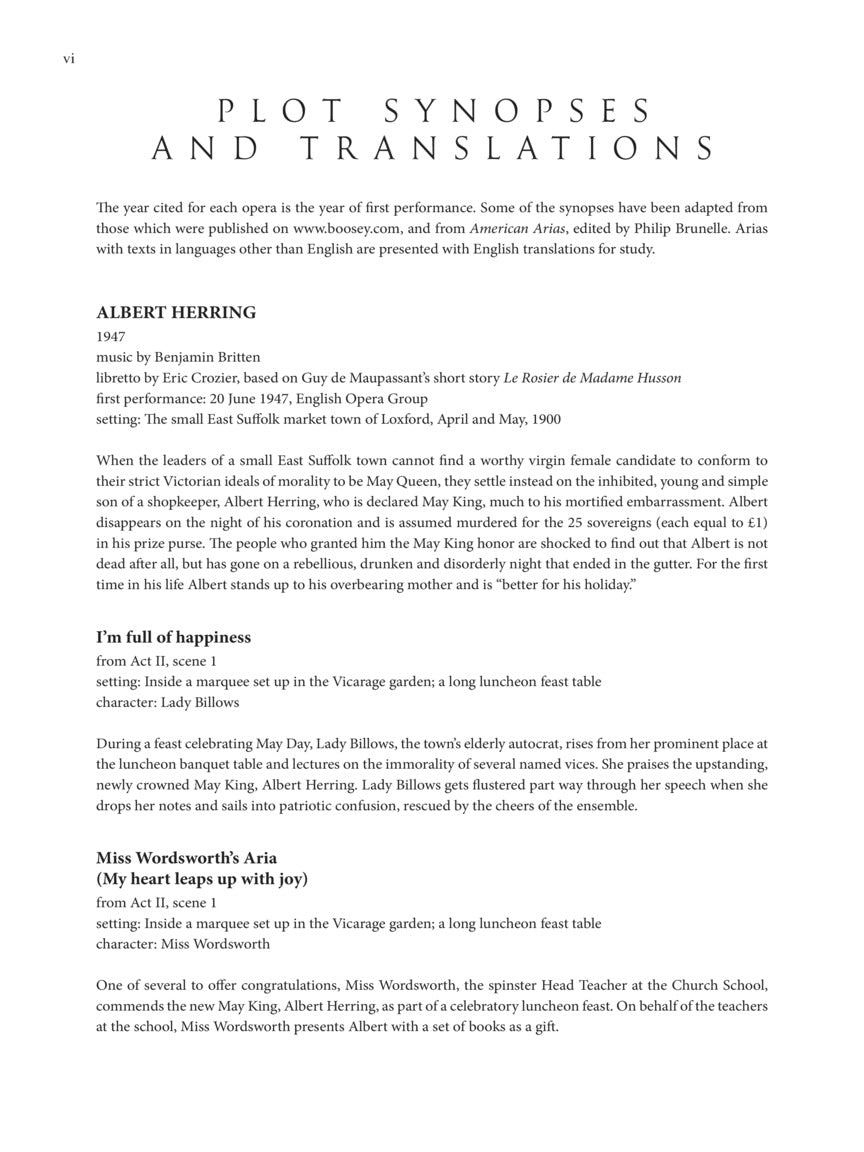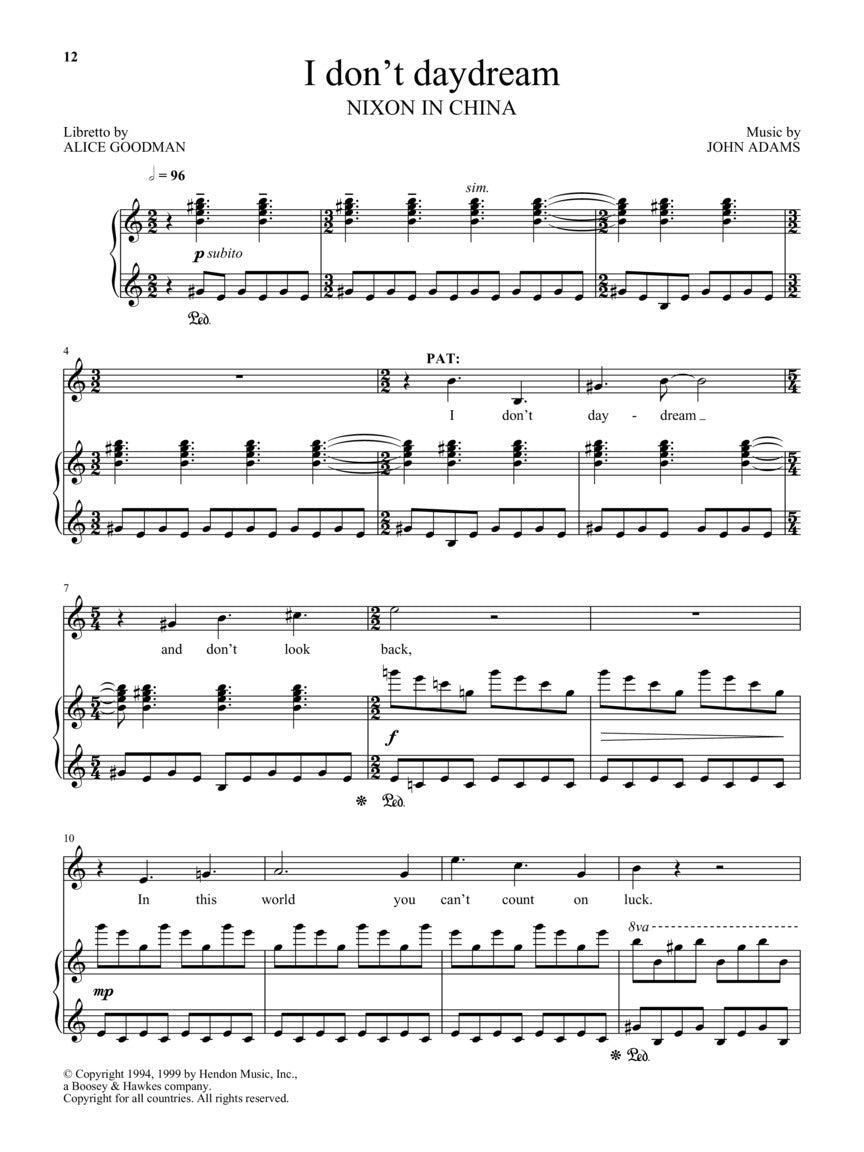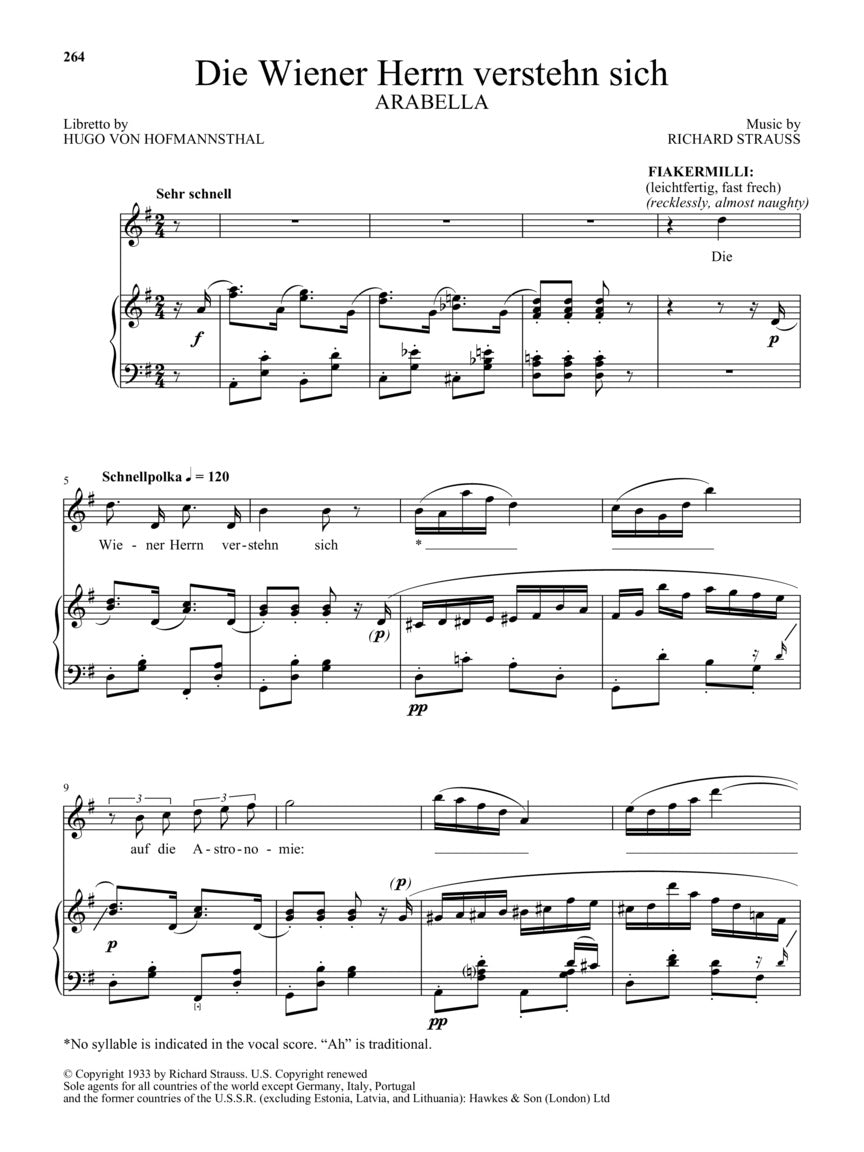Boosey & Hawkes Opera Anthology – Soprano
Expected to ship in 1-2 weeks.
- Composers: Benjamin Britten (1913-1976), Jack Beeson (1921-2010), Aaron Copland (1900-1990), Richard Strauss (1864-1949), Henry Purcell (1659-1695), Carlisle Floyd (1926-2021), Leonard Bernstein (1918-1990), Igor Stravinsky (1882-1971), John Adams (1947-), Dominick Argento (1927-2019), Sergei Rachmaninoff (1873-1943), Ned Rorem (1923-2022)
- Editor: Richard Walters
- Instrumentation (this edition): Piano Reduction, Soprano
- Originally for: Opera
- ISMN:
- Size: 9.0 x 12.0 inches
- Pages: 306
Description
This landmark publication collects arias and role excerpts from operas by John Adams, Benjamin Britten, Carlisle Floyd, Richard Strauss, and many other composers published by Boosey & Hawkes. Includes extensive plot notes and translations. The soprano volume also includes ten arias for coloratura.
Works:
- Am I in your light? from J. Adams: Doctor Atomic
- I am the wife of Mao Tsetung from J. Adams: Nixon in China
- I don't daydream from J. Adams: Nixon in China
- The Widow's Aria from Argento: The Boor
- Though absent from these ears and eyes from Argento: Casanova's Homecoming
- Virginia's Aria from Argento: The Voyage of Edgar Allan Poe
- Dede's Aria from Bernstein: A Quiet Place (1983)
- I'm full of happiness from Britten: Albert Herring, Op. 39
- Miss Wordsworth's Aria from Britten: Albert Herring, Op. 39
- The Dressing-Table Song from Britten: Gloriana, Op. 53
- The Queen's Dilemma from Britten: Gloriana, Op. 53
- Injurious Hermia from Britten: A Midsummer Night's Dream, Op. 64
- Let her among you without fault from Britten: Peter Grimes, Op. 33
- Embroidery Aria from Britten: Peter Grimes, Op. 33
- How beautiful it is from Britten: The Turn of the Screw, Op. 54
- Lost in my labyrinth from Britten: The Turn of the Screw, Op. 54
- Laurie's Song from Copland: The Tender Land (1954)
- Rented rooms from Floyd: Cold Sassy Tree
- Curly's Wife's Aria from Floyd: Of Mice and Men
- Ain't it a pretty night from Floyd: Susannah (1955)
- The trees on the mountains from Floyd: Susannah (1955)
- I've dreamt in my life from Floyd: Wuthering Heights
- I'm like a skiff on the ocean tossed from Britten: Beggar's Opera, Op. 43
- When young at the bar...Ungrateful Macheath! from Britten: Beggar's Opera, Op. 43
- Oft she visits this lov'd mountain from Purcell: Dido and Aeneas, Z. 626
- Thanks to these lonesome vales from Purcell: Dido and Aeneas, Z. 626
- Francesca's Aria from Rachmaninoff: Francesca da Rimini, Op. 25
- Emily's Aria from Rorem: Our Town (2005)
- Das war sehr gut, Mandryka from Strauss: Arabella, TrV 263, Op. 79
- Es gibt ein Reich from Strauss: Ariadne auf Naxos, TrV 228, Op. 60
- Kein Andres, das mir so im Herzen loht from Strauss: Capriccio, TrV 279, Op. 85
- Da geht er hin from Strauss: Der Rosenkavalier, TrV 227, Op. 59
- No word from Tom...I go to him from Stravinsky: The Rake's Progress (1951)
- I see in you a looking glass from Argento: Miss Havisham's Fire
- Lady with a Hand Mirror Aria from Argento: Postcard from Morocco
- Beeson: Aurelia's Aria from Captain Jinks of the Horse Marines
- Glitter and Be Gay from Bernstein: Candide (1989)
- Come, now a roundel from Britten: A Midsummer Night's Dream, Op. 64
- Be kind and courteous from Britten: A Midsummer Night's Dream, Op. 64
- Die Wiener Herrn verstehn sich from Strauss: Arabella, TrV 263, Op. 79
- Grossmätige Prinzessin from Strauss: Ariadne auf Naxos, TrV 228, Op. 60
- Stravinsky: Chanson du Rossignol from The Nightingale (Le Rossignol) (1914)
Publishers use a lot of words to describe what they sell, and we know it can be confusing. We've tried to be as clear as possible to make sure you get exactly what you are looking for. Below are descriptions of the terms that we use to describe the various formats that music often comes in.
Choral Score
A score for vocalists that only contains the vocal lines. The instrumental parts are not there for reference. Generally, cheaper than a vocal score and requires multiple copies for purchase.
Facsimile
Reproductions of the original hand-written scores from the composer.
Full Score
For ensemble music, this indicates that the edition contains all parts on a single system (there are not separate parts for each player). In larger ensembles, this is for the conductor.
Hardcover
Hardbound. Generally either linen-covered or half-leather.
Orchestral Parts
Similar to a wind set, this is a collection of parts. In the case of strings, the numbers listed are the number of copies included, though generally these are available individually (often with minimum quantities required).
Paperback
When publishers offer multiple bindings (e.g. hardcover) or study scores, this is the "standard" version. If you're planning to play the music, this is probably what you want.
Performance / Playing Score
A score of the music containing all parts on one system, intended for players to share. There are not separate parts for each player.
Set of Parts
For ensemble music, this indicates that there are separate individual parts for each player.
Solo Part with Piano Reduction
For solo pieces with orchestra, this is a version that contains a piano reduction of the orchestra parts. For piano pieces, two copies are typically needed for performance.
Study Score
A small (think choral size) copy of the complete score meant for studying, and not playing. They make great add-ons when learning concertos and small chamber works.
Vocal Score
A score prepared for vocalists that includes the piano/organ part or a reduction of the instrumental parts.
Wind Set
For orchestral music, this is a collection of wind and percussion parts. The specific quantities of each instrument are notated.
With Audio
In addition to the printed music, the edition contains recordings of the pieces. This may be an included CD, or access to files on the internet.
With / Without Fingering (Markings)
Some publishers prepare two copies - a pure Urtext edition that includes no fingering (or bowing) suggestions and a lightly edited version that includes a minimal number of editorial markings.








